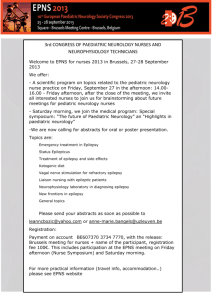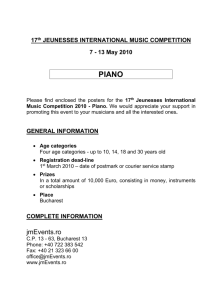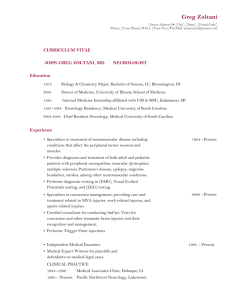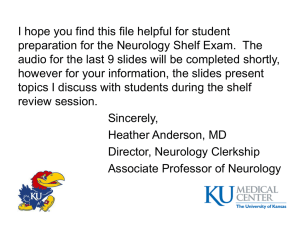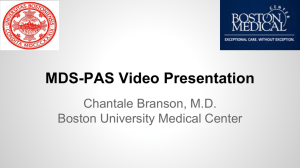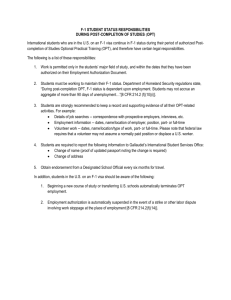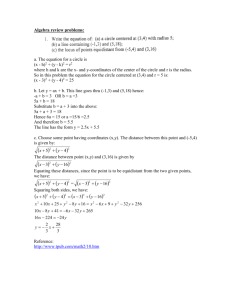EPNS Research Meeting 2014 12
advertisement
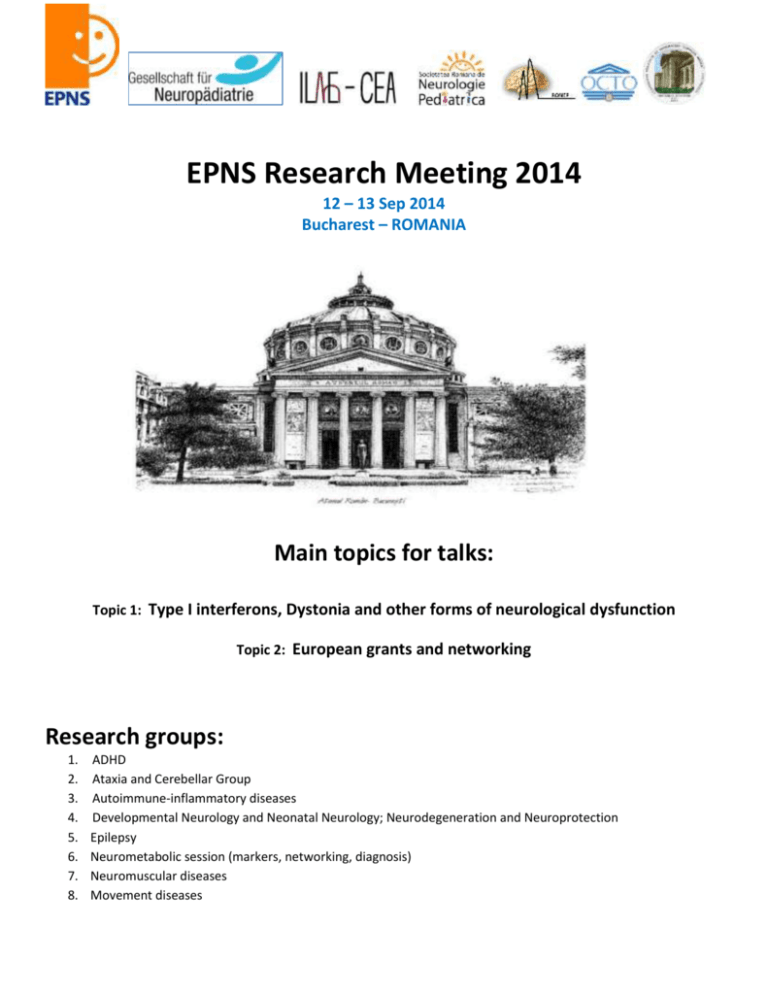
Univers “C Str. Dio EPNS Research Meeting 2014 12 – 13 Sep 2014 Bucharest – ROMANIA Main topics for talks: Topic 1: Type I interferons, Dystonia and other forms of neurological dysfunction Topic 2: European grants and networking Research groups: 1. 2. 3. 4. 5. 6. 7. 8. ADHD Ataxia and Cerebellar Group Autoimmune-inflammatory diseases Developmental Neurology and Neonatal Neurology; Neurodegeneration and Neuroprotection Epilepsy Neurometabolic session (markers, networking, diagnosis) Neuromuscular diseases Movement diseases Univers “C Str. Dio DEAR COLLEAGUES, We are very happy to invite you to the 4th EPNS Research Conference which is to be held in Bucharest , Romania, 12-13 September 2014 at the Intercontinental Hotel Bucharest, in the very heart of Bucharest. The Research Conference is organised by the EPNS, CEA-ILAE, SRNP (Romanian Society of Pediatric Neurology), with the help of RONEP (Romanian Foundation of Neurology and Epileptology) and Rotary Club OCTO Bucharest. EPNS Research Conference is a forum for researchers in the area of Paediatric Neurology, where they present their work, ideas, results, creating the possibility for good interaction between researchers and premises for networking, future collaborative research in Europe and beyond. As usual, there will be 2 plenary sessions and 8 parallel working groups where the most experienced professionals and young researchers will get together, in an environment where interactive, vivid discussions will take place around the presented topics. At the final discussion each group will present their working group summary. Publications of the working groups’ discussions and conclusions may follow. Bucharest is a cosmopolitan place with a beautifully restored old city located 10 minutes walk from the Conference venue. We hope you will enjoy your stay in Bucharest from both a scientific and leisure point of view! Looking forward to meeting you in Bucharest! Dana Craiu Local Organiser DEADLINE FOR EARLY REGISTRATION 15 August 2014 BURSARIES 14 bursaries of 500 euro each (10 from the EPNS for any working group and 4 from CEA ILAE for the epilepsy working group) will be offered to young investigators. Bursary request, CV, recommendation from head of the department should be sent to flore.ronep@yahoo.com Bursary applications can be accepted from everywhere in the world. It is a condition for receiving a bursary that applicants must be a fully paid up member of the EPNS, presenting a project or their work at the Research meeting. If more than 14 applications are received, priority will be given to the youngest applicants. Deadline for receiving bursary applications is 10 August 2014. Applicants will receive a response by 12 August 2014. All bursary applicants will pay registration fee, make their own reservation and travel arrangements. The bursary recipients will be reimbursed after the research meeting after sending the claim form with their personal data. EPNS RESEARCH PRIZE There is an EPNS award at every research conference The EPNS Research Prize (2500 euro) this year will be awarded to two young neurologists who present an outstanding, innovative idea in the area of research in Pediatric Neurology. A commission of the board members will decide the prize recipients. PROGRAM PAEDIATRIC NEUROLOGY RESEARCH CONFERENCE The Research meeting is structured around group discussions which represent the main part of the conference. All groups will work in parallel. Two main topics for lectures are decided every year by Scientific Committee of the EPNS board. Univers “C Str. Dio The draft structure of the programme is as such: Friday, September 12, 2014 12.00-13.00 13.00-13.15 13.15-14.15 14.15-16.30 16.30-17.00 17.00-19.00 19.30 Arrival Registration Lunch Welcome Plenary Lecture 1 Type I interferons, Dystonia and other forms of neurological dysfunction: Yannick Crow Working groups 1-8 Coffee Break Working groups 1-8 Get together and Dinner Saturday, September 13, 2012 08.30-09.30 09.30-10.30 Working groups 1-8 Plenary Lecture 2 Value of registries and networks in rare diseases: Samantha Parker 10.30-11.00 11.00-13.00 13.00-13.15 13.15-13.30 13.30 Coffee Break Presentations, discussions and conclusions of the working groups 1-8 Award of the EPNS Research Prize CONCLUSIONS Lunch/Farewell If you would like to participate actively in preparation of your workshop or if you would like to present something during your workshop please contact the chair of your working group directly. The EPNS and SRNP websites will have more detailed programmes of some of the working groups which will be updated on a regular basis as the information is provided by the chairs of the working groups. Website links: www.epns.info and www.srnp.ro This information will be updated on a monthly basis up until September 2014. The 8 WORKING GROUPS AND THEIR TOPICS 1. Attention Deficit Disorder: Chair: Manuel Antonio Fernandez (drlolo13@hotmail.com). In this working group will try to bring together professionals from different areas to share experiences and work on developing unified programs of assistance, research and teaching in various aspects of interest in ADHD. Will address the main issues of interest including genetics, neuroimaging, new technologies in clinical care and seek to join forces to ensure better diagnosis and treatment of these patients. All stakeholders are invited to participate actively in this group with the intention of creating a network of experts to standardize the criteria for ADHD care in different countries Univers “C Str. Dio 2. Ataxia and Cerebellar Group: Chair: Maja Steinlin (Maja.Steinlin@insel.ch) Update on validation of the SARA testing - Deborah Sival. Update and first results from the database congenital and early ataxias - Mathis Synofzik. Presentation of different research projects – NN. Please contact the chair (maja.steinlin@insel.ch), if you would like anything to contribute in our presentations/ discussions. Ataxia and Cerebellar Group: programme Friday Sep 12 14:15–14:30 Welcoming and introduction, Maja Steinlin 14:30-15:15 SARA validation study by Childhood Ataxia and Cerebellar Group, Deborah Sival 15:15–15:30 Exergame-based training in children with advanced multisystemic ataxia: first group results and call for Coworkers, Matthis Synofzik 15:30 -15:45 Genetic factors in spinocerebellar ataxia type III (SCA3): new molecular therapeutic targets at the trancriptome (mRNA and microRNA) and protein level of mutant gene expression, Ileana Constantinescu, Natalia Cucu, Dana Craiu 15:45- 16:15 New data from the Italian ataxia database, Maria Valente 18:00-18:30 New data from the European ataxia database, Matthis Synofzik 18:30-18:45 The power of collaborative efforts to find novel genes, Matthis Synofzik 18:45-19:00 Future and discussion Saturday Sep 13 8:30-8:45 Update on data base and call for coworkers, Maja Steinlin, Matthis Synofzik 8:45-9:00 Time for further discussions! Possible presentations on short notice Univers “C Str. Dio 3. Autoimmune inflammatory diseases: Chairs: Banu Anlar (banlar@hacettepe.edu.tr), Martin Häusler (mhaeusler@ukaachen.de), Kevin Rostasy (kevin.rostasy@uki.at) Participants of the autoimmune / inflammatory working group will have the opportunity to present their own projects. The group will also work on one specific research project that will be determined according to the proposals (please specify if you wish your project to be taken into this detailed presentation and on-site discussion). The group plans to present the following projects: MS outcome, radiological and biological markers (B Anlar, C Lechner& K Rostasy) MOG Ab-positive CNS disease (M Lim) For free discussions, the following are being proposed: Neurological signs in primary immune deficiency diseases Is ROHHAD autoimmune? Registry of rare neurological diseases, namely SSPE, epidemiology of SSPE following measles The discussions are informal, welcoming any free flow of ideas. We look forward to your participation. Autoimmune inflammatory diseases: programme Friday Sep 12 14.15-16.30 Autoimmunity: MOG-Ab in CNS disease (Lim), MOG- and AQP-4-IgG Ab in children with NMOSD and NMO related symptoms (Lechner & Rostasy group), Transcend MS (Lim&Deiva) , RCT in TM (Gadian J) 17.00-19.00 Infection: New Approach in Management of Acute Meningitis (Yepiskopsyan), Inflammatory molecules in SSPE (Hasegawa), Registry in SSPE and rare diseases (Anlar) Saturday Sep 13 8 30-9 30 Fetuin in n-infl (Elsas&Hausler), Three potential treatment questions in NMDAR encephalitis (Hacohen), Is ROHHAD autoimmune? (Anlar) Univers “C Str. Dio 4. Developmental Neurology (System Neurology / Clinical Neurophysiology / Functional Imaging) and Neonatal Neurology, Neurodegeneration and Neuroprotection:: Chairs: Regina Trollmann (regina.trollmann@uk-erlangen.de) and Adrian Toma (adrian_ioan.toma@yahoo.com). The focus of this group are techniques of advanced imaging, transcranial magnetic stimulation (and other techniques of clinical neurophysiology), evaluation of neuronal plasticity, early brain (re)organisation and the context of brain structure and function. Further clinical issues of cerebral palsy are a focus of this group, especially quality of life evaluation, hip development as well as epidemiology. The discussion will also cover newest research data on models of perinatal brain hypoxia and ischemia, their effects and their contribution to clarify the pathophysiology of hypoxic ischemic brain injury. You are welcome to bring your own ideas, to inform about your own model, to get help in choosing an appropriate model for your own research questions. Information on neuroprotective strategies will be shared and possible joint research on neuroprotectives in asphyxia will be discussed. Neurology, Neurodegeneration and Neuroprotection: programme 14:15-14:30 Welcoming and introduction, Regina Trollmann – Erlangen, Germany 14:30-15:00 Prognosis in minor CNS structural anomalies detected antenatally – A project Proposal, Toma AI, Pelinescu Onciul D, Craiu D, Zaharie G – Bucharest & Cluj , Romania 15:00-15:20 Development of neuroprotective strategies for the SGA newborn. Single-blinded randomized controlled study. Stamatin M, Dimitriu DC, Avasiloaiei AL - Iasi, Romania 15:20-15:40 Preterm small-for-gestational age children: Predictive role of gestational age for mental development at the age of 2 years. Nögel SC, Trollmann R – Erlangen, Germany 15:40-16:00 Management of refractory neonatal seizures. Neubauer D, Soltirovska-Salamon A, Osredkar D, Paro-Panjan D – Ljubljana, Slovenia 16.00-16.20 Markers of perinatal asphyxia in the premature neonate. Zaharie P G- Cluj 16.20-16.40 Prevalence of LIS1 and related genes in a population based sample in patients with epilepsy and developmental delay. Carratalá F – Alicante, Spain 18.00-18.20 Perinatal brain injury: synergistic interplay between LPS, glutamate and hypoxia. Jung S, Brackmann FA, Trollmann R – Erlangen, Germany 18:20-18:40 Activin A as a neuroprotective factor during hypoxia and seizures in developing mouse brain. Brackmann FA, Jung S, Alzheimer C, Trollmann R – Erlangen, Germany 18:40-19:00 Pain in small-for-gestational age infants. Nögel SC, Zeilhofer HU, Dötsch J–Erlangen, Germany 19.00 Summary, Future and discussion Univers “C Str. Dio 5. Epilepsy: Chairs: Alexis Arzimanoglou (aarzimanoglou@orange.fr), Helen Cross (h.cross@ucl.ac.uk) and Floor Jansen (f.e.jansen@umcutrecht.nl) The Epilepsy working group will informally discuss a number of ongoing international studies. There is still a possibility to submit other studies or research proposals. In that case we will shorten some of the presentations to 20 minutes. We hope to attract many participants! Epilepsy: programme Friday September 12 14:15 - 14:30 Welcoming and introduction Helen Cross, UCL London 14:30 - 15:15 Corticosteroids or clobazam for ESES syndrome: a European, multicenter, randomized, controlled clinical trial (RESCUE ESES): outline and progress Bart van den Munckhof, UMC Utrecht Inflammation in epileptic encephalopathy with ESES Eveline de Vries, UMC Utrecht 15:15 – 15:40 Prognosis in Landau-Kleffner and Continuous Spikes in Slow-Wave sleep syndromes – Epileptic Encephalopathy Longitudinal Multicentre Omics (ELMO) Study Deb Pal, King’s College London 15:40 - 16:10 Genetics in Rolandic epilepsy Bernd Neubauer, Center for Genomics Cologne 16:10 - 16:30 Etiological, clinical and electroencephalographic peculiarities, treatment strategy and predictors of the long-term outcome of the patients with West’s syndrome Ana Kvernadze, Tbilisi, Georgia 17:00-17:30 Clinical trial in Idiopathic focal epilepsies Deb Pal, King’s College London 17:30-18:00 AED withdrawal after epilepsy surgery; the Time to stop study: Outline and progress Helen Cross, UCL London 18:00-18:30 ketogenic diet pre treatment for FCD (EDIBLE study): outline and progress Helen Cross, UCL London 18:30-19:00 Anxiety in children with epilepsy G Pilina Saturday September 13 08:30-08:50 Long-term, prospective study evaluating clinical and molecular biomarkers of EPIleptogenesiS in a genetic model of epilepsy – Tuberous SclerOsis ComPlex (EPISTOP): outline and progress Hanna Hulshof, UMC Utrecht 08:50-09:30 General discussion and concluding remarks Univers “C Str. Dio 6. Metabolics: Chairs: Linda De Meirleir (linda.demeirleir@uzbrussel.be), Barbara Plecko (barbara.plecko@kispi.uzh.ch). The main theme will be about biomarkers in neurometabolic disorders but also networking in neuro-metabolic diseases. If you have a project you want to present or a collaboration you want to extend, or some interesting preliminary results on your research, please contact the Chairs direct so they can put you in their workshop programme. Metabolics: programme Friday Sept 12th 2014 14.15-14.30 Welcome and introduction of participants 14.30-14.50 Introduction to the topic (B. Plecko, Zurich) Discussion 14.50-15.20 Homocystein (M. Schiff, Paris) Discussion 15.20-15.30 Introduction of InNerMed (L. Cvitanovic, Zagreb) Discussion 15.30-16.30 other presentations / case discussions 17.00-17.30 Thiamine (B. Perez-Duenas, Barcelona) Discussion 17.30-17.50 Metabolomics (B. Plecko, Zurich) Discussion 17.50-18.00 PMD proposal (L. Ming, London) Discussion 18.00-18.20 Management of IEM in Moldova (N. Usurelu, Moldova) Discussion 18.20-19.00 other presentations / (case) discussions Univers “C Str. Dio 7. Neuromuscular group: Chair: Thomas Sejersen (thomas.sejersen@ki.se) The Neuromuscular Working Group aims to discuss the latest research developments and plans relevant for the diagnosis, care and treatment of paediatric neuromuscular diseases. The discussion will focus on the application of new omics approaches, current and future clinical trials and international neuromuscular projects funded by the EU. The working group session will also provide an opportunity for scientists and clinicians to present own research ideas and results. Neuromuscular group: programme Friday 12 September: 14:15-14:30 Welcoming and introduction, Thomas Sejersen, Volker Straub, Nathalie Goemans, Markus Schuelke 14:30-15:10 Clinical trials for spinal muscular atrophy, Thomas Sejersen 15:10-15:50 Outcome measures in non-ambulant neuromuscular disorders, Nathalie Goemans 15:50-16:30 Value of MRI analyses in neuromuscular diseases, Volker Straub 17:00-17:30 Clinical and genetic study of SMA in Romania over a period of 10 years Niculina Butoianu 17:30-18:00 Height Prediction using Anthropometric Measurements in Children with Neuromuscular diseases, treated and not treated with Glucocorticoids, Irina Duff 18:00-18:30 Neuromuscular diseases in Moldavia, a genetic model of severity of myopathic process. Victoria Sacara 18:30-19:00 The importance of Natural History studies in Neuromuscular disorders – experience from the Institute of Myology in Paris, Ruxandra Cardas Saturday 13 September: 8:30-9:30 Summarizing discussion and future Univers “C Str. Dio 8. Movement disorders: Jean Pierre Lin (Jean-Pierre.Lin@gstt.nhs.uk ) and Michel Willemsen (michel.willemsen@radboudumc.nl). In January 2014 the EPNS Scientific Board agreed to create an EPNS Movement Disorders Research Group to promote research into movement disorders in children. The purpose of this group is to harness the considerable potential of European child neurology to collaborate on strategic themes within paediatric movement disorders, like hypothesis generation, clinical studies and trials. The following research themes have been identified: demographic features, diagnostic tools and assessment scales, therapeutic management, and studies on underlying disease mechanisms (using biomarkers, imaging techniques etc). Any ideas/ proposals may be sent direct to the chairs. Movement Disorders Working Group : programme Friday 12 September: 14:15-14:30 Welcome and Introduction, Jean-Pierre Lin and Michel Willemsen Five PhD Projects on Movement Disorders in Children in evolution 14:30-15:00 “Intrathecal baclofen treatment in dystonic cerebral palsy: a randomized clinical trial: the IDYS trial. Bonouvrié LA, Becher JG, Vles JS, Boeschoten K, Soudant D, de Groot V, van Ouwerkerk WJ, Strijers R, Foncke E, Geytenbeek J, van de Ven PM, Teernstra O, Vermeulen RJ 15.00-16:00 “Assessing the true burden of early-onset dystonia: A pilot study to evaluate the health related quality of life and the impact of dystonia severity and pain.” Wieke Eggink, University Medical Center Groningen, The Netherlands. 16:00-17:00 “The application of scales for measuring outcomes following interventions in dystonia including concerns of children & families.” Hortensia Gimeno, NIHR Clinical Research Fellow, Department of Clinical Psychology, Institute of Psychiatry, Psychology and Neurology, King’s College London & Complex Motor Disorders Service, Evelina London Children’s Hospital, UK. 17:00-18:00 “Advanced MRI techniques, connectivity of distributed cerebral networks and prognosis for Deep Brain Stimulation in children with dystonia.” Daniel E Lumsden, Specialist Registrar, Children’s Neurosciences, Evelina London Children’s Hospital, UK. 18:00-19:00 “Complex Decision-making in Children with Dystonia: Measuring and Modeling Change, a Statistical Approach” Markus Elze, Department of Statistics, University of Warwick, UK. *Note in view of the full programme, refreshments will be available during the afternoon for participants instead of the 30 minute pause. Visitors welcome at any time! Saturday 13 September: 8:30-9.00 “Can we alter the natural history of secondary dystonias: the impact of time, aetiology, genes and environmental perturbation.” Jean-Pierre Lin, Complex Motor Disorders Service, Evelina London Children’s Hospital 9:00-9:30 “Movement Disorders in children: Summarising discussion and future research collaborations within the EPNS”. Michel Willemsen, Radboud Medical Centre, Nijmegen, Netherlands. Jean-Pierre Lin, Complex Motor Disorders Service, Evelina London Children’s Hospital Send further applications for the Movement Disorders Working Group to: jeanpierrelin@icloud.com Univers “C Str. Dio ORGANISING COMMITTEE Diana Barca Magdalena Budisteanu Carmen Burloiu Dana Craiu Catrinel Iliescu Vintan Mihaela Carmen Sandu Oana Tarta-Arsene Adrian Toma Secterary: Florentina Grigore, flore.ronep@yahoo.com tel/fax: 004021 3347994 mobile: 0040724966816 Booking Form PERSONAL DETAILS Title First Name Surname Position Place of Work Address for correspondence Telephone Email Please write your email address very clearly so that we are able to read it. We will email information to you before the course. Univers “C Str. Dio REGISTRATION FEES (includes registration, coffee breaks. all meals without alcoholic drinks): Early registration (until August 15th, 2014) 80 Euro Late registration (from August 16th, 2014) 100 Euro The registration is only finalised upon receiving your payment to the following bank account: "Fundatia Romana de Neurologie si Epileptologie, RONEP" (on-line payment will be available soon) Address: Str Mr Ionescu Atanase nr.43, sector 2, Bucuresti, Romania Bank: BCR Sucursala Mihai Bravu, Bank address: Soseaua Mihai Bravu nr 172 Bl.230, sector 2, Bucuresti Romania IBAN (lei): RO 28 RNCB 0084 0107 6462 0001 IBAN (euro): RO 44 RNCB 0084 0107 6462 0004 SWIFT code: RNCBROBU Romanian participants may pay lei at National Bank exchange rate of the day of payment or euro. All the other participants will pay euro. BOOKING I will attend the following working group (attention – groups will work in parallel): Attention deficit disorder Ataxia Autoimmun-inflammatory diseases Developmental Neurology and Neonatal Neurology; Neurodegeneration and Neuroprotection Epilepsy Neurometabolic session Neuromuscular diseases Movement diseases ACCOMMODATION All attendees must book their own accomodation. A special deal has been offered by the Intercontinental Hotel (5*) for this event. Other accommodation possibilities exist in Bucharest- hostels, apart-hotels, but no deals have been established for these- it is possible to request advice about the alternative accomodation by contacting our Secretary – flore.ronep@yahoo.com If you would like to stay at the Intercontinental Hotel please use this link to book your room reservation - EPNS Research Conf 2014 Remember - make your hotel reservation directly with the hotel and pay the hotel directly by 22 August 2014. Cancellation rules are given on the hotel website. Please note: 22 August is the absolute last date rooms can be guaranteed and attendees will be able to benefit from the significantly discounted rates. After 22 August it is likely attendees will have to book alternative hotels which will possibly cost more. Course registration fees must be paid to our foundation bank account directly in order to finalise your attendance. payment deadline for the early registration fee of 80EURhas been extended to 15 August 2014. After this date, attendees will have to pay the late registration fee which is 100EUR Univers “C Str. Dio Hotel Intercontinental Hotel Bucharest single room 70 euro/night Intercontinental Hotel Bucharest double room 85 euro/night I do not need accommodation Check-in date Check-out date Sharing with - Please, book as fast as possible at Intercontinental hotel, before August 22nd , as other events may be organised in the same location sending us your preference – see table above and payment in the account below (on-line payment will be soon available) . TRANSPORT Bucharest is linked by direct flights with most of the European cities. The national company – www.tarom.ro may offer special deals and new connections with Bucharest. You may want to also use special searching engines for cheap flights as: www.edreams.com; www.skyscanner.com TRANSFERS Henry Coanda Bucharest Airport is located 20 km away from the city centre. Arrival to the venue is possible by: - Taxi – when you get out in the main arrival hall – go to the right – you will find 3 automatic desks (monitors) and you can order taxi – be careful and select the lowest price – 1.39 lei /km (30eurocents/km) – unless of course you would like to order a limo. - Bus – you may ask at information desk where you can buy tickets from. – you have to get down at University Place (Piata Universitatii) – Intercontinental Hotel is just across the road. SPECIAL REQUIREMENTS Please let us know if you have any special dietary requirements (food allergies etc) or if you are a vegetarian or vegan so that we can make provision for you. For vegetarians, please specify if you eat cheese or other products from milk. _____________________________________________________________________ __________________ PAYMENT – Deadline for early registration payment – 15 August 2014 Payment must be made at the time of your booking to "Fundatia Romana de Neurologie si Epileptologie, RONEP" Address: Bank: Bank address: IBAN (lei): IBAN (euro): SWIFT code: Str Mr Ionescu Atanase nr.43, sector 2, Bucuresti, Romania BCR Sucursala Mihai Bravu, Soseaua Mihai Bravu nr 172 Bl.230, sector 2, Bucuresti Romania RO 28 RNCB 0084 0107 6462 0001 RO 44 RNCB 0084 0107 6462 0004 RNCBROBU Romanian participants may pay lei at National Bank exchange rate of the day of payment or euro. All the other participants will only pay euro. Univers “C Str. Dio PLEASE SEND THIS COMPLETED FORM: By e-mail: flore.ronep@yahoo.com , by fax or post to: Mrs. Florentina Grigore Pediatric Neurology Clinic Al Obregia Hospital Sos Berceni 10 Sector 4, Bucharest, Romania Fax: 004 021 3347994
